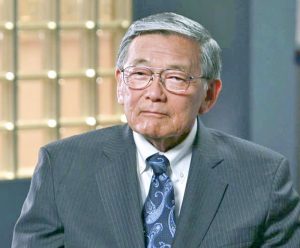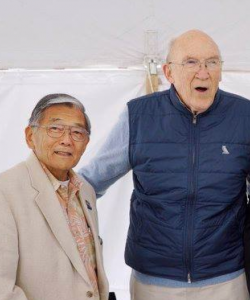The documentary based on the statesman’s life premieres May 20 on PBS.

The Hon. Norman Mineta is a man of many firsts: first Asian American mayor of a major city, the first Japanese American from the mainland to be elected to Congress and the first Asian American to serve in a presidential cabinet. A documentary on his life is set to air in May on PBS.
SAN FRANCISCO — “Norman Mineta and His Legacy: An American Story,” a documentary portrait of the American statesman and trailblazer, premieres on PBS on May 20 at 9 p.m. ET (check local listings).
Directed by Dianne Fukami and co-produced by Fukami and Debra Nakatomi, the film includes interviews with the two presidents under whom Mineta served as a cabinet secretary: Democrat Bill Clinton and Republican George W. Bush.
Also interviewed in the documentary is retired Republican Sen. Alan Simpson, who formed a lifelong friendship with Mineta when they met as 11-year-olds at Heart Mountain, Wyo., the U.S. concentration camp where Mineta and his family were incarcerated during World War II.
Mineta is a man of many firsts: the first Asian American mayor of a major city (San Jose, Calif.); the first Japanese American from the mainland to be elected to Congress; and the first Asian American to serve in a presidential cabinet. But beyond these groundbreaking achievements, Mineta personifies the dreams and aspirations of many Americans.
A U.S. citizen by birth, he was imprisoned by his own country for his Japanese ancestry, yet he steadfastly remained a patriot, leading a Congressional effort for an apology from the U.S. government and redress for Japanese Americans, 120,000 of whom were imprisoned during the war. That effort finally came to fruition when the Civil Liberties Act of 1988 was signed into law by President Ronald Reagan.
During his 21 years in Congress, Mineta worked to right other wrongs. Retired Rep. Barney Frank of Massachusetts speaks in the film of the role Mineta played in endorsing same-sex marriage. A co-author of the 1991 Americans with Disabilities Act, Mineta pushed to make public facilities accessible after navigating San Jose in a wheelchair and realizing it was impossible to cross the street. Because of the ADA, streets around the country now have cutouts for wheelchair access.
When Mineta was serving as Secretary of Transportation under Bush, the president learned firsthand of Mineta’s time in a concentration camp. A few months later, in the aftermath of Sept. 11, 2001, the knowledge of what his cabinet secretary went through had an impact.
“One of the important things about Norm’s experience is that sometimes we lose our soul as a nation,” said Bush. “The notion of ‘all equal under God’ sometimes disappears. And 9/11 certainly challenged that premise. So, right after 9/11, I was deeply concerned that our country would lose its way and treat people who may not worship like their neighbor as noncitizens. So, I went to a mosque. And in some ways, Norm’s example inspired me. In other words, I didn’t want our country to do to others what had happened to Norm.”
In 2006, Secretary Mineta resigned from the Bush administration. He had served more than five years, longer than any Secretary of Transportation in American history. In his three decades as a public servant, he had served as a city councilman, a mayor, an 11-term congressman and a cabinet member for both a Democratic and a Republican president.
“Norm Mineta spent his life both proving by his own achievements that America was working for more and more people but also trying to give that chance to everybody else,” said President Clinton. “And that’s a worthy life. It should be honored, but more importantly, it should be emulated.”

Norm Mineta and former Sen. Alan Simpson are pictured at Heart Mountain in 2015. The two have maintained a lifelong friendship since first meeting as 11-year-olds at Heart Mountain, Wyo.
The broadcast of the documentary will be accompanied by free online educational curriculum being developed by the Stanford Program for International Cross-Cultural Education at Stanford University.
Featuring original content separate from the film, the curriculum includes a roundtable discussion with high school students discussing their own present-day experiences with discrimination, social activism and leadership.
The modular-based curriculum designed for high school and university educators uses Mineta’s life and experiences as touch points to educate students about immigration, civic engagement, leadership, U.S.-Japan relations and justice and reconciliation.
“Norman Mineta and His Legacy: An American Story” is directed and produced by Fukami, co-produced by Fukami and Nakatomi and written by Ken Chowder. The film is narrated by Wendy Tokuda.
Funding for “Norman Mineta and His Legacy: An American Story” was provided by the Terasaki Family Foundation, the Toshizo Watanabe Foundation, the Sachiko Kuno Foundation, AARP, the Japanese American Community Foundation and other major funders.
ABOUT THE FILMMAKERS
Dianne Fukami (director/co-producer) has produced, directed and written more than a half-dozen documentaries on the Asian American experience (mostly on Japanese American history), which were broadcast on PBS stations throughout the U.S. “Separate Lives, Broken Dreams,” about the Chinese Exclusion Act, was nominated for a national Emmy Award; “Starting Over: Japanese Americans After the War” has received scholarly citations for its first-person anecdotes. Her most recent documentary, “Stories From Tohoku,” was showcased at CAAMFest in 2014 (formerly the San Francisco Asian International Film Festival) and screened at film festivals in New York and Los Angeles.
Debra Nakatomi (co-producer) is the founder of a strategic communications firm, Nakatomi and Associates, that for more than 25 years has developed issue advocacy and educational campaigns on health, environmental and social issues. The firm designs social and civic engagement campaigns utilizing the tools of media, messaging and social media. Nakatomi’s documentary career began as co-producer of “Stories From Tohoku,” with Fukami in 2014, a film about the survivors of the 2011 earthquake, tsunami and nuclear disaster in Japan. The film aired on PBS and screened throughout the U.S. and Japan.



